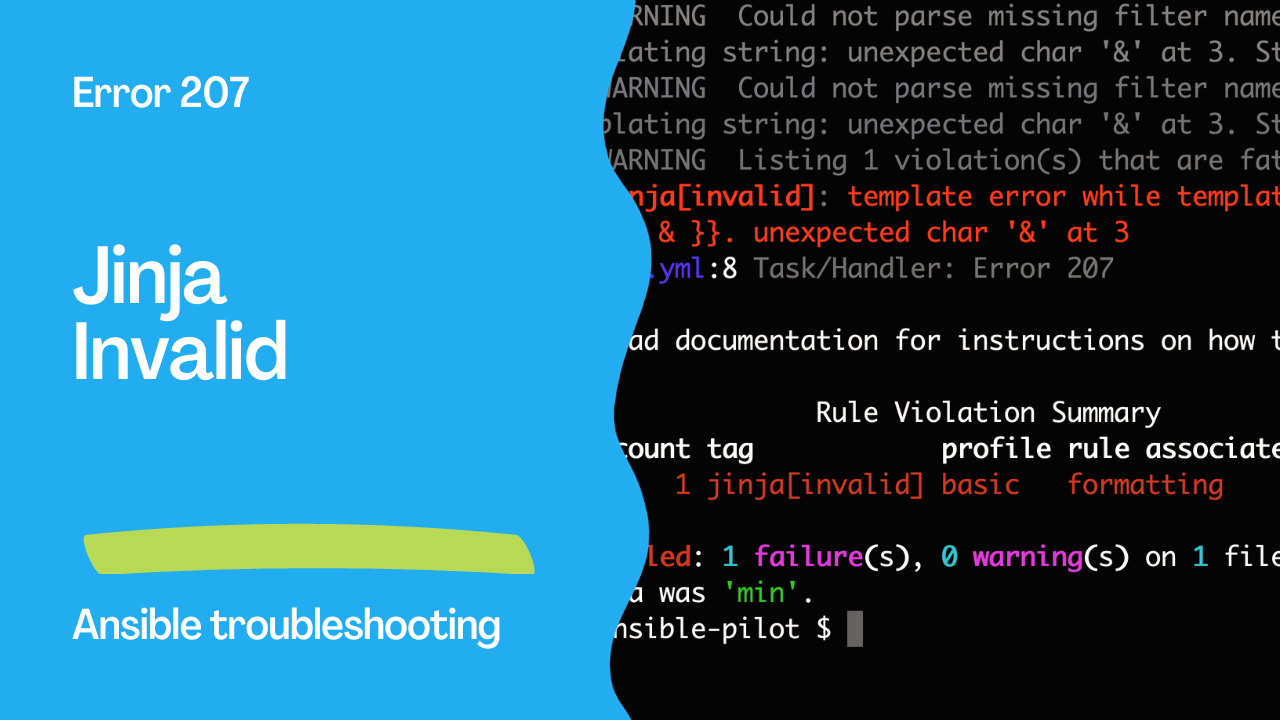Introduction
Ansible, the popular automation tool, leverages the power of Jinja2 templates to enable dynamic configurations, data manipulation, and conditional processing in playbooks. However, using Jinja2 templates effectively and correctly is essential to ensure that your Ansible playbooks run without errors. In this article, we’ll explore Ansible Error 207, “jinja[invalid]”, in Ansible-Lint which focuses on the detection of invalid Jinja2 templates in your Ansible playbooks. We’ll discuss the importance of template validity and how adhering to best practices can help you avoid runtime errors and maintain the reliability of your automation tasks.
The Problem: Detecting Invalid Jinja2 Templates
Ansible Error 207, “jinja[invalid]”, is designed to identify invalid Jinja2 templates within your playbooks. Invalid templates, such as double curly braces within an expression (e.g., {{ {{ ‘1’ }} }}), can result in runtime errors if you attempt to use them with Ansible, even if they pass the Ansible syntax check.
Problematic Code Example:
---
- name: Example error 207
hosts: all
tasks:
- name: Error 207
ansible.builtin.debug:
vars:
bar: "{{ & }}" # <-- jinja[invalid]
In the problematic code above, the Jinja2 template contains an invalid expression that uses the ampersand symbol (&) without proper formatting within double curly braces.
Output:
WARNING Could not parse missing filter name from error message: template error while templating string: unexpected char '&' at 3. String: {{ & }}. unexpected char '&' at 3
WARNING Could not parse missing filter name from error message: template error while templating string: unexpected char '&' at 3. String: {{ & }}. unexpected char '&' at 3
WARNING Listing 1 violation(s) that are fatal
jinja[invalid]: template error while templating string: unexpected char '&' at 3. String: {{ & }}. unexpected char '&' at 3
207.yml:8 Task/Handler: Error 207
Read documentation for instructions on how to ignore specific rule violations.
Rule Violation Summary
count tag profile rule associated tags
1 jinja[invalid] basic formatting
Failed: 1 failure(s), 0 warning(s) on 1 files. Last profile that met the validation criteria was 'min'.

Correcting Invalid Jinja2 Templates
To address Ansible Error 207 and ensure the validity of your Jinja2 templates, follow best practices for correct formatting. Here’s the corrected code:
---
- name: Example error 207
hosts: all
tasks:
- name: Error 207
ansible.builtin.debug:
vars:
bar: "{{ '&' }}"
In the corrected code, the Jinja2 template has been formatted correctly within double curly braces, ensuring its validity.
Benefits of Correcting Invalid Jinja2 Templates
- Preventing Runtime Errors: Ensuring the validity of Jinja2 templates helps prevent runtime errors when you execute your Ansible playbooks.
- Consistency: Correctly formatted templates contribute to a standardized and consistent codebase, making your playbooks more readable and maintainable.
- Adherence to Best Practices: Following best practices for Jinja2 templates aligns with Ansible guidelines and fosters reliable automation tasks.
- Automatic Fixing: Ansible Error 207 can be automatically fixed using the
ansible-lint --fixoption, streamlining the process of correcting invalid templates.
Current Limitations
It’s important to be aware of the current limitations of Ansible Error 207:
- Jinja2 blocks with newlines may not be reformatted as it’s assumed that the user has intentionally formatted them in a specific way.
- Jinja2 blocks that use the tilde (
~) as a binary operation are ignored because the popular Python code formatter, “black,” does not support the tilde as a binary operator. - Jinja2 blocks that use dot notation with numbers are ignored because both Python and “black” do not allow it.
Conclusion
Ansible Error 207, “jinja[invalid]”, highlights the significance of valid Jinja2 templates within Ansible playbooks. By ensuring that your templates are correctly formatted and free from invalid expressions, you can run your playbooks without runtime errors and maintain the reliability of your automation tasks.
In the world of automation, meticulous attention to detail and adherence to best practices are key to achieving consistent, error-free results. So, when working with Ansible, remember to validate your Jinja2 templates and enjoy smoother, more dependable playbooks.
Subscribe to the YouTube channel, Medium, and Website, X (formerly Twitter) to not miss the next episode of the Ansible Pilot.Academy
Learn the Ansible automation technology with some real-life examples in my
Udemy 300+ Lessons Video Course.

My book Ansible By Examples: 200+ Automation Examples For Linux and Windows System Administrator and DevOps

Donate
Want to keep this project going? Please donate
